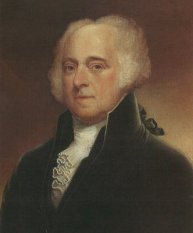 |
John Adams
10/30/1735
– 7/4/1826
2nd
President
1st
Vice-president
Signer of
the Declaration of Independence
(Reference) |
1. “We recognize no Sovereign but
God, and no King but Jesus!” (He
and John Hancock gave this response to a British major who ordered them
and those with them to disperse in the name of George the sovereign King
of England on April 18 1775.)
2.
"Before I end my
letter, I pray Heaven to bestow the best of Blessings on this House and
all that shall hereafter inhabit it. May none but honest and wise Men
ever rule under this roof." (letter to his wife,
Abigail, November 2,1800, on his second day of residence in the damp,
unfinished White House.)
3.
"Avarice, ambition, revenge, or gallantry would break the
strongest cords of our constitution as a whale goes through a net. Our
constitution was made only for a moral and religious people. It is
wholly inadequate to the government of any other."
(1798 speech to the first brigade of the militia of Massachusetts)
4. The general principles on which the
fathers achieved independence were the general principles of
Christianity. I will avow that I then believed, and now believe, that
those general principles of Christianity are as eternal and immutable as
the existence and attributes of God. (Excerpt from
a letter written to Thomas Jefferson June 28, 1813)
5. The Holy Ghost carries on the whole
Christian system in this earth. Not a baptism, not a marriage, not a
sacrament can be administered but by the Holy Ghost. . . . There is no
authority, civil or religious – there can be no legitimate government
but what is administered by this Holy Ghost. There can be no salvation
without it. All without it is rebellion and perdition, or in more
orthodox words damnation. (Excerpt from a letter
written to Benjamin Rush December 21, 1809) |
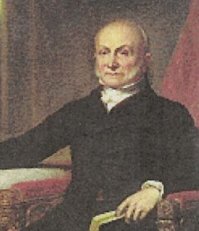 |
John Quincy Adams
7/11/1767 -
2/23/1848
6th President
Senator,
Representative
Secretary of
State
(Reference) |
1. The hope of a
Christian is inseparable from his faith. Whoever believes in the Divine
inspiration of the Holy Scriptures must hope that the religion of Jesus
shall prevail throughout the earth. Never since the foundation of the
world have the prospects of mankind been more encouraging to that hope
than they appear to be at the present time. And may the associated
distribution of the Bible proceed and prosper till the Lord shall have
made “bare His holy arm in the eyes of all the nations, and all the ends
of the earth shall see the salvation of our God” [Isaiah 52:10].
(Life of John Quincy Adams, W. H. Seward,
editor (Auburn, NY: Derby, Miller & Company, 1849), p. 248)
2. In the chain of
human events, the birthday of the nation is indissolubly linked with the
birthday of the Savior. The Declaration of Independence laid the
cornerstone of human government upon the first precepts of Christianity.
(Speech given on the 61st anniversary
on the declaration of independace July 4, 1837 in the town of
Newburyport.)
|
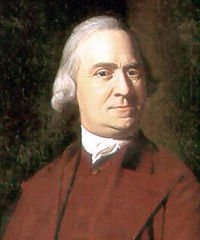 |
Samuel Adams
9/22/1722
–
10/2/1803
Governor of
Massachusetts
Father of the
American Revolution
Signer of
the Declaration of Independence
(Reference) |
1. I . . . recommend my Soul to that
Almighty Being who gave it, and my body I commit to the dust, relying
upon the merits of Jesus Christ for a pardon of all my sins.
(a portion of his will) |
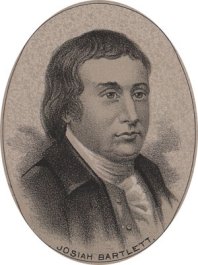 |
Dr. Josiah Bartlett
11/21/1729
–
5/19/1795
Signer of
the Declaration of Independence
Military
Officer
Judge,
Governor of NH
(Reference) |
1. Called on the people of New Hampshire .
. . to confess before God their aggravated transgressions and to implore
His pardon and forgiveness through the merits and mediation of Jesus
Christ . . . that the knowledge of the Gospel of Jesus Christ may be
made known to all nations, pure and undefiled religion universally
prevail, and the earth be fill with the glory of the Lord.
(Proclamation for a Day of Fasting and Prayer,
March 17, 1792.) |
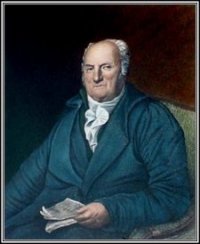 |
Elias Boudinot
5/2/1740 -
10/24/1821
4th President
of Congress
Signed the
peace treaty to end the Revolutionary War
First Attorney
admitted to the U.S. Supreme Court Bar.
Framer of the
Bill of Rights
(Reference) |
1.
Let us enter on this important business under the idea that we are
Christians on whom the eyes of the world are now turned… [L]et us
earnestly call and beseech Him, for Christ’s sake, to preside in our
councils. . . . We can only depend on the all powerful influence of the
Spirit of God, Whose Divine aid and assistance it becomes us as a
Christian people most devoutly to implore. Therefore I move that some
minister of the Gospel be requested to attend this Congress every
morning . . . in order to open the meeting with prayer.
(speech in the First Provincial Congress of New
Jersey.)
|
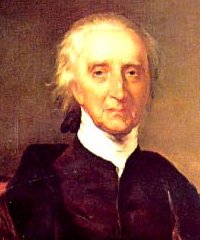 |
Charles Carroll
9/19/1737
– 11/14/1832
Signer of
the Declaration of Independence
Last surviving signer of the
Declaration of Independence, and only Roman Catholic to sign.
U. S. Senator from Maryland.
(Reference) |
1.
On the mercy of my Redeemer I rely for salvation and on His merits; not
on the works I have done in obedience to His precepts,
for even these, I fear a fallacy. (From an
autographed letter from Charles Carroll to Charles W. Wharton, Esq., on
September 27, 1825) |
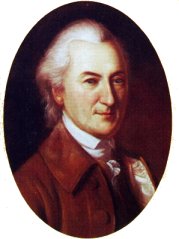 |
John Dickinson
11/2/1732
–
2/14/1808
Signer of
the
Constitution
Militia officer in the
Revolutionary War
Congressman from Delaware,
and Pennsylvania
(Reference) |
1.
Rendering thanks to my Creator for my existence and station among His
works, for my birth in a country enlightened by the Gospel and enjoying
freedom, and for all His other kindnesses, to Him I resign myself,
humbly confiding in His goodness and in His mercy through Jesus Christ
for the events of eternity. (Will of John
Dickinson) |
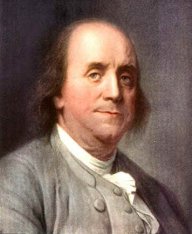 |
Benjamin Franklin
1/17/1706
–4/17/1790
Signer of
the Declaration of Independence
Scientist,
Inventor, Statesman, Printer, Philosopher, Musician, Economist.
(Reference) |
1. “I
have lived, sir, a long time, and the longer I live, the more convincing
proofs I see of this truth, that God governs in the affairs of men. And if a sparrow
cannot fall to the
ground without his notice, is it probable that an empire can rise
without His aid? We have been assured in the Sacred Writings that 'except
the Lord build the house, they labor in vain that build it.' I firmly
believe this. I also believe that, without His concurring aid, we shall
succeed in this political building no better than the builders of Babel....Therefore,
I beg leave to move that henceforth prayers imploring the assistance of
heaven, and its blessings on our deliberations be held in this assembly
every morning”
(When it looked like there could be no agreement
the 81 year old statesman addressed the
Constitutional Convention of 1787) (Bible quote: Psalms 127: 1)
2.
He proposed that each session of congress begin with prayer.
3."That
there is one God, Father of the universe. That He is infinitely good,
powerful and wise. That He is omnipresent. That He ought to be
worshipped, by adoration prayer and thanksgiving both in public and
private." (
In 1731 he
articulated a creed to live by, both personally and in public life: ) |
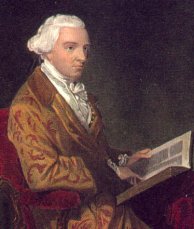 |
John Hancock
1/12/1737 – 10/8/1793
Signer of
the Declaration of Independence
(Reference) |
1. “We recognize no Sovereign but
God, and no King but Jesus!” (He
and John Adams gave this response to a British major who ordered them
and those with them to disperse in the name of George the sovereign King
of England on April 18 1775.)
2. "In
circumstances as dark as these, it becomes us, as Men and Christians, to
reflect that whilst every prudent measure should be taken to ward off
the impending judgments, …at the same time all confidence must be
withheld from the means we use; and reposed only on that God rules in
the armies of Heaven, and without His whole blessing, the best human
counsels are but foolishness… Resolved; …Thursday the 11th of May…to
humble themselves before God under the heavy judgments felt and feared,
to confess the sins that have deserved them, to implore the Forgiveness
of all our transgressions, and a spirit of repentance and reformation
…and a Blessing on the … Union of the American Colonies in Defense of
their Rights [for which hitherto we desire to thank Almighty God]…That
the people of Great Britain and their rulers may have their eyes opened
to discern the things that shall make for the peace of the nation…for
the redress of America’s many grievances, the restoration of all her
invaded liberties, and their security to the latest generations."
(A Day
of Fasting, Humiliation and Prayer, with a total abstinence from labor
and recreation. Proclamation on April 15, 1775) |
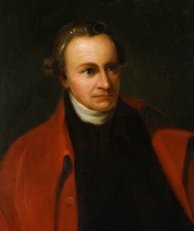 |
Patrick Henry
5/29/1736 - 6/6/1799
Instrumental in the adoption of the Bill of Rights
Governor of Virginia
(Reference) |
1.
“It
cannot be emphasized too clearly and too often that this nation was
founded, not by religionists, but by Christians; not on religion, but on
the gospel of Jesus Christ. For this very reason, peoples of other
faiths have been afforded asylum, prosperity, and freedom of worship
here.” (a
Speech to the House of Burgesses in May 1765)
2.
"An appeal to arms and the God of hosts is all that is left
us. But we shall not fight our battle alone. There is a just God that
presides over the destinies of nations. The battle sir, is not of the
strong alone. Is life so dear, or peace so sweet, as to be purchased at the
price of chains and slavery? Forbid it, Almighty God! I know not what
course others may take; but as for me, give me liberty or give me
death!" (a
Speech to the House of Burgesses in March 23, 1775)
3. This is all the inheritance I can give
to my dear family. The religion of Christ can give them one which will
make them rich indeed.
(Will of
Patrick Henry)
4. The great pillars of all government and
of social life [are] virtue, morality, and religion. This is the armor,
my friend, and this alone, that renders us invincible.
(Letter to
Archibald
Blair on January 8, 1799.) |
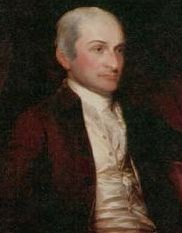 |
John Jay
12/12/1745 - 5/17/1829
1st
Chief Justice of the Supreme Court
President of the Westchester Bible
Society in 1818
President of the American Bible
Society in 1821
(Reference) |
1.
"
Providence has given to our people the choice of their rulers, and it is
the duty, as well as the privilege and interest of our Christian nation
to select and prefer Christians for their rulers."
(October 12, 1816) |
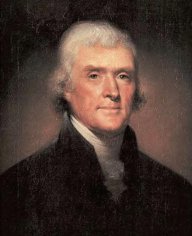 |
Thomas Jefferson
4/13/1743
– 7/4/1826
Signer of
the Declaration of Independence
3rd
President
(Reference) |
1. “It [the Bible] is a document in
proof that I am a real Christian, that is to say, a disciple of the
doctrines of Jesus." (wrote this in a
letter to Charles Thomson Jan 9, 1816.)
2.
Almighty God, Who has given us this good land for our
heritage; We humbly beseech Thee that we may always prove ourselves a
people mindful of Thy favor and glad to do Thy will. Bless our land with
honorable ministry, sound learning, and pure manners. Save us from
violence, discord, and confusion, from pride and arrogance, and from
every evil way. Defend our liberties, and fashion into one united
people, the multitude brought hither out of many kindreds and tongues.
Endow with Thy spirit of wisdom those whom in Thy name we entrust the
authority of government, that there may be justice and peace at home,
and that through obedience to Thy law, we may show forth Thy praise
among the nations of the earth. In time of prosperity fill our hearts
with thankfulness, and in the day of trouble, suffer not our trust in
Thee to fail; all of which we ask through Jesus Christ our Lord. Amen.
(Prayer of the Nation Washington D.C. March
4,1801) |
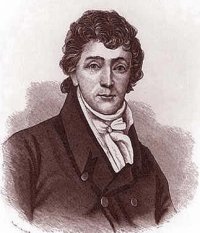 |
Francis Scott Key
8/1/1779 -
1/11/1843
U.S. Attorney
for D.C.
Author of
the Star
Spangled Banner
(Reference) |
1.
May I always hear that you are following the guidance of that blessed
Spirit that will lead you into all truth, leaning on that Almighty arm
that has been extended to deliver you, trusting only in the only Savior,
and going on in your way to Him rejoicing. (Letter
from Francis Scott Key to John Randolph.)
The
Star Spangled Banner Francis Scott Key (September
14, 1814)
1.Oh, say, can you see, by the dawn's early light,
What so proudly we hailed at the twilight's last gleaming?
Whose broad stripes and bright stars, thro' the perilous fight,
O'er the ramparts we watched, were so gallantly streaming?
And the rockets' red glare, the bombs bursting in air,
Gave proof through the night that our flag was still there.
O say, does that star-spangled banner yet wave
O'er the land of the free and the home of the brave?
2. On the shore dimly seen thro' the mists of the deep,
Where the foe's haughty host in dread silence reposes,
What is that which the breeze, o'er the towering steep,
As it fitfully blows, half conceals, half discloses?
Now it catches the gleam of the morning's first beam,
In full glory reflected, now shines on the stream:
'T is the star-spangled banner: O, long may it wave
O'er the land of the free and the home of the brave!
|
3. And where is that band who so vauntingly
swore
That the havoc of war and the battle's confusion
A home and a country should leave us no more?
Their blood has washed out their foul footsteps' pollution.
No refuge could save the hireling and slave
From the terror of flight or the gloom of the grave:
And the star-spangled banner in triumph doth wave
O'er the land of the free and the home of the brave.
4. O, thus be it ever when freemen shall stand,
Between their loved homes and the war's desolation;
Blest with vict'ry and peace, may the heaven-rescued land
Praise the Power that hath made and preserved us as a nation!
Then conquer we must, when our cause, it is just,
And this be our motto: In God is our trust
And the star-spangled banner in triumph shall wave
O'er the land of the free and the home of the brave!
|
|
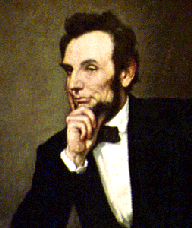 |
Abraham Lincoln
2/12/1809 - 4/15/1865
16th
President
(Reference) |
1."And whereas it is the duty of nations as well as of men, to own
their dependence upon the overruling power of God, to confess their sins and
transgressions, in humble sorrow, yet with assured hope that
genuine repentance will lead to mercy and pardon; and to recognize the
sublime truth, announced in the Holy Scriptures and proven by all
history, that those nations only are blessed whose God is the Lord."
(Portion
of a speech on March 30 1863, when he declared Thursday, April 30, 1863,
as a day of national humiliation, fasting and prayer.) |
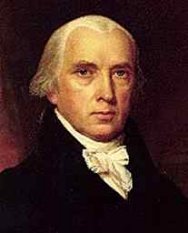 |
James Madison
3/16/1751 - 6/28/1836
4th
President
(Reference) |
1.“We have staked the whole future of
American civilization, not upon the power of government, far from it.
We’ve staked the future of all our political institutions upon our
capacity…to sustain ourselves according to the Ten Commandments of God.”
(an address to the General Assembly of the State of Virginia in 1778)
2.At the Constitutional Convention of 1787,
he proposed the plan to divide the central government into three
branches. He discovered this model of government from the bible, as he
read at the convention Isaiah 33:22
For the LORD is our judge,
(Judicial)
the LORD is our lawgiver, (Congress)
the LORD is our king;
(Executive)
He will save us.”
3.
In 1812, President Madison proposed a federal bill which
economically aided the Bible Society of Philadelphia in its goal of the
mass distribution of the Bible. “ An Act for the relief of the Bible
Society of Philadelphia” Approved February 2, 1813 by Congress.
4. A watchful eye must be kept on ourselves
lest, while we are building ideal monuments of renown and bliss here, we
neglect to have our names enrolled in the Annals of Heaven.
(Letter to William Bradford on November 9, 1772.)
|
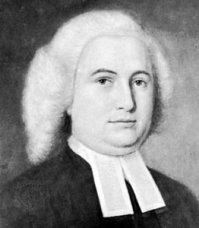 |
James Manning
10/22/1738 -
7/29/1791
Member of the
Continental Congress
President of
Brown University
(Reference) |
1.
I
rejoice that the religion of Jesus prevails in your parts; I can tell
you the same agreeable news from this quarter. Yesterday I returned from
Piscataway in East Jersey, where was held a Baptist annual meeting (I
think the largest I ever saw) but much more remarkable still for the
Divine influences which God was pleased to grant. Fifteen were baptized;
a number during the three days professed to experience a change of
heart. Christians were remarkably quickened; multitudes appeared.
(Letter to Robert Carter on June 7, 1786) |
|
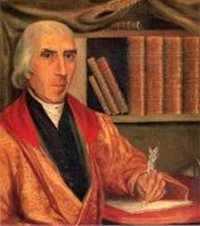 |
Rev. Jedidiah Morse
7/23/1761 -
6/9/1826
Historian of
the American Revolution
Father of
American Geography
(Reference) |
1.
To the kindly influence of Christianity we owe that degree of
civil freedom and political and social happiness which mankind now
enjoys. All efforts made to destroy the foundations of our Holy Religion
ultimately tend to the subversion also of our political freedom and
happiness. In proportion as the genuine effects of Christianity are
diminished in any nation… in the same proportion will the people of that
nation recede from the blessings of genuine freedom… Whenever the
pillars of Christianity shall be overthrown, our present republican
forms of government – and all the blessings which flow from them – must
fall with them. (A Sermon, Exhibiting the Present
Dangers and Consequent Duties of the Citizens of the United States of
America, Delivered at Charlestown, April 25, 1799, The Day of the
National Fast) |
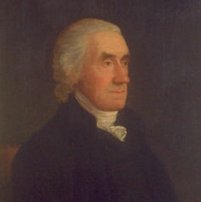 |
Robert Treat Paine
3/11/1731 -
5/11/1814
Signer of the Declaration of
Independence
Military
Chaplin
Attorney
General MA
(Reference) |
1.
I desire to bless and praise the name of God most high for appointing me
my birth in a land of Gospel Light where the glorious tidings of a
Savior and of pardon and salvation through Him have been continually
sounding in mine ears. …… I believe the Bible to be the written word of
God and to contain in it the whole rule of faith and manners.
(Robert Treat Paine’s Confession of Faith, 1749)
2.
I am constrained to express my adoration of the Supreme Being, the
Author of my existence, in full belief of His Providential goodness and
His forgiving mercy revealed to the world through Jesus Christ, through
whom I hope for never ending happiness in a future state.
(From his Last Will & Testament, attested May 11,
1814.)
|
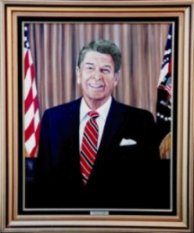 |
Ronald Wilson Reagan
2/6/1911 - 6/5/2004
40th
President
(Reference) |
1.
"To those who cite the First Amendment as reason for excluding God from more
and more of our institutions and every-day life, may I just say: The First
Amendment of the Constitution was not written to protect the people of this
country from religious values; it was written to protect religious values from
government tyranny.” ( address to
the Alabama State Legislature on
March 15, 1982)
2.
“The public
expression through prayer of our faith in God is a fundamental part of
our American heritage and a privilege which should not be excluded by
law from any American school, public or private. One hundred fifty years
ago, Alexis de Tocqueville found that all Americans believed that
religious faith was indispensable to the maintenance of their republican
institutions. Today, I join with the people of this nation in
acknowledging this basic truth, that our liberty springs from and
depends upon an abiding faith in God.”
(Speech on a proposed a
constitutional amendment allowing prayer in schools May 17, 1982)
3.
"It’s said that prayer can move mountains. Well, it’s certainly moved
the hearts and minds of Americans in their times of trial and helped
them to achieve a society that, for all its imperfections, is still the
envy of the world and the last, best hope of mankind.”
(Radio
address to the nation Sept. 18, 1982)
4.
“Your
dreams, your hopes, your goals are going to be the dreams, the hopes,
and the goals of this administration, so help me God....I am told that
tens of thousands of prayer meetings are being held on this day, and for
that I am deeply grateful. We are a nation under God, and I believe God
intended for us to be free. It would be fitting and good, I think, if on
each Inauguration Day in future years it should be declared a day of
prayer.”
(First
Inaugural address, January 20,1981) |
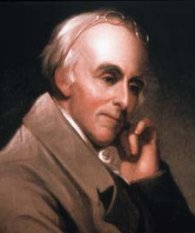 |
Dr. Benjamin Rush
12/24/1745 -
4/19/1813
Signer of the Declaration of
Independence
The father of public schools
under the constitution
The father of American
medicine
The father of American
psychiatry.
(Reference)
|
1. "Let the children who are sent to those schools be taught to read and
write - - - (and a)bove all, let both sexes be carefully instructed in the
principles and obligations of the Christian religion. This is the most
essential part of education - -" (wrote this when
he proposed his plan for public education in America on March 28, 1787.)
2.
"It is now several months since I promised to give you my reasons
for preferring the Bible as a schoolbook to all other compositions.
Before I state my arguments, I shall assume the five following
propositions:
-
That Christianity is
the only true and perfect religion; and that in proportion as
mankind adopts its principles and obeys its precepts they will be
wise and happy.
-
That a better
knowledge of this religion is to be acquired by reading the Bible
than in any other way.
-
That the Bible
contains more knowledge necessary to man in his present state than
any other book in the world.
-
That knowledge is most
durable, and religious instruction most useful, when imparted in
early life.
-
That the Bible, when
not read in schools, is seldom read in any subsequent period of
life.
My arguments in favor of the
use of the Bible as a schoolbook are founded"
(In 1791 he wrote a
pamphlet entitled 'A Defense of the Use of the Bible as a Schoolbook'.
Here is how that writing began:)
3. The Gospel of
Jesus Christ prescribes the wisest rules for just conduct in every
situation of life. Happy they who are enabled to obey them in all
situations! . . . My only hope of salvation is in the infinite
transcendent love of God manifested to the world by the death of His Son
upon the Cross. Nothing but His blood will wash away my sins [Acts
22:16]. I rely exclusively upon it. Come, Lord Jesus! Come quickly!
[Revelation 22:20] (The Autobiography of Benjamin
Rush, Travels Through Life, An Account of Sundry Incidents &
Events in the Life of Benjamin Rush.)
4.
I do not believe that the Constitution was the offspring of
inspiration, but I am as satisfied that it is as much the work of a
Divine Providence as any of the miracles recorded in the Old and New
Testament. (Letter to Elias Boudinot on July 9,
1788.)
5.
The only means of establishing and perpetuating our republican forms of
government is the universal education of our youth in the principles of
Christianity by means of the Bible. (Essay “A
Defense of the Use of the Bible as a School Book.”)
6.
The great enemy of the salvation of man, in my opinion, never invented a
more effective means of limiting Christianity from the world than by
persuading mankind that it was improper to read the Bible at schools.
(Letter to Jeremy Belknap on July 13, 1789.) |
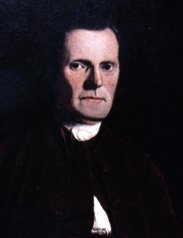 |
Roger Sherman
4/19/1721 -
7/23/1793
Signer of the Declaration of
Independence
Served on the
committee of five that drafted the Declaration of Independence.
Only
person to sign all four, original papers of the US-Articles of
Association, Declaration of Independence , Articles of Confederation,
and the Constitution.
(Reference) |
1.
I believe that there is one only living and true God, existing in three
persons, the Father, the Son, and the Holy Ghost. . . . that the
Scriptures of the Old and New Testaments are a revelation from God. . .
. that God did send His own Son to become man, die in the room and stead
of sinners, and thus to lay a foundation for the offer of pardon and
salvation to all mankind so as all may be saved who are willing to
accept the Gospel offer. (Lewis
Henry Boutell, The Life of Roger Sherman)
2.
God commands all men everywhere to repent. He also commands them to
believe on the Lord Jesus Christ, and has assured us that all who do
repent and believe shall be saved… God… has absolutely promised to
bestow them on all these who are willing to accept them on the terms of
the Gospel – that is, in a way of free grace through the atonement. “Ask
and ye shall receive [John 16:24]. Whosoever will, let him come and take
of the waters of life freely [Revelation 22:17]. Him that cometh unto me
I will in no wise cast out” [John 6:37]. (letter
to Samuel Hopkins, June 28, 1790.)
3.
“The volume which he consulted more than any other was the Bible. It was
his custom, at the commencement of every session of Congress, to
purchase a copy of the Scriptures, to peruse it daily, and to present it
to one of his children on his return.” (From The Globe
(Washington DC newspaper), August 15, 1837) |
|
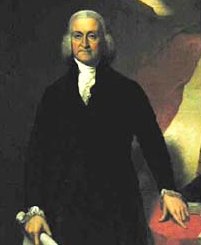 |
Jonathan Trumbull
10/12/1710 -
8/17/1785
Governor of
CT,
Judge,
Legislator,
Confidant of
George Washington
(Reference) |
1.
The examples of holy men teach us that we should seek Him with fasting
and prayer, with penitent confession of our sins, and hope in His mercy
through Jesus Christ the Great Redeemer.
(Proclamation for a Day of Fasting and Prayer, March 9, 1774)
2.
Principally and first of all, I bequeath my soul to God the Creator and
giver thereof, and my body to the earth to be buried in a decent
Christian burial, in firm belief that I shall receive the same again at
the general resurrection through the power of Almighty God, and hope of
eternal life and happiness through the merits of my dear Redeemer Jesus
Christ. (Last will and testament attested on
January 29, 1785)
|
 |
George Washington
2/22/1732 – 12/14/1799
1st President
Commander
in Chief of the Continental Army
(Reference) |
1.“What
students would learn in American schools above all is the religion of
Jesus Christ.” (From a speech to the Delaware
Indian Chiefs May 12, 1779)
2."I
humbly beseech Thee to be merciful to me in the free pardon of my sins
for the sake of Thy dear Son and
only Savior Jesus Christ who
came to call not the righteous, but sinners to repentance. Thou gavest Thy Son
to die for me.” (From his personal prayer book dated April
21-23 1752)
3. "It would
be peculiarly improper to omit, in this first official act, my fervent
supplications to that Almighty Being, who rules over the universe, who
presides in the councils of nations, and whose providential aids can
supply every human defect, that His benediction may consecrate to the
liberties and happiness of the people of the United States…No people can
be bound to acknowledge and adore the invisible hand which conducts the
affairs of men more than the people of the United States…
(First inauguration address 1788, Washington then took the oath as prescribed by the Constitution
but added several religious components to that official ceremony. Before
taking his oath of office, he summoned a Bible on which to take the
oath, added the words “So help me God!” to the end of the oath, then
leaned over and kissed the Bible.)
4.
On May 17, 1776, he wrote
that that day was, "...to be observed as a day of fasting humiliation
and prayer, humbly to supplicate the mercy of almighty God, that it
would please Him to pardon all our manifold sins and transgressions, and
to prosper the arms of the united colonies, and finally establish the
peace and freedom of America upon a solid and lasting foundation."
(In May of 1776, fighting was well under way in
the American Revolution. For General George Washington it was a
stressful time. Under his command in New York he had about 7 thousand
men. The rag tag army was poorly trained. They were about to face some
thirty thousand soldiers from the most highly trained and successful
military force in the world. The Americans were outnumbered and
outgunned. As they waited in New York for the onslaught of British
military power, Washington issued orders for his troops to pray for the
campaign ahead.) |
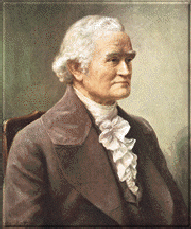 |
Noah Webster
10/16/1758 -
5/28/1843
Yale class of 1778
Teacher, Lawyer, Author,
Statesman
(Reference) |
1. “In my view, the Christian religion
is the most important and one of the first things in which all children,
under a free government ought to be instructed...No truth is more
evident to my mind than that the Christian religion must be the basis of
any government intended to secure the rights and privileges of a free
people.” (He placed this in the preface of the
American Dictionary of the English Language in 1828)
2. He produced
his own modern English translation of the Bible in 1833. Though an
excellent and highly accurate translation, Webster’s Bible was not
widely accepted, due to the continued popularity of the ancient King
James version.
3. "When you become entitled to exercise
the right of voting for public officers, let it be impressed on your
mind that God commands you to choose for rulers, just men who will rule
in the fear of God. The preservation of a republican government depends
on the faithful discharge of this duty; if the citizens neglect their
duty, and place unprincipled men in office, the government will soon be
corrupted." (Advice to the Young" from Value of
the Bible and Excellence of the Christian Religion, 1834)
4.
The Christian religion… is the basis, or rather the source, of all
genuine freedom in government… I am persuaded that no civil government
of a republican form can exist and be durable in which the principles of
Christianity have not a controlling influence.
(Letter to James Madison on October 16, 1829) |
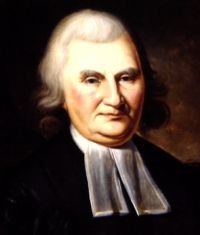 |
John Witherspoon
2/15/1723 -
11/15/1794
Signer of the
Declaration of Independence.
Only active
clergyman to sign (Presbyterian Church of America)
Only active
College President to sign (Princeton University)
(Reference) |
1.
I entreat you in the most earnest manner to believe in Jesus Christ, for
there is no salvation in any other [Acts 4:12]. . . . If you are not
reconciled to God through Jesus Christ, if you are not clothed with the
spotless robe of His righteousness, you must forever perish.
(The Works of John Witherspoon by John
Witherspoon) |
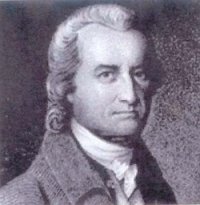 |
Oliver Wolcott
12/1/1726 -
12/1/1797
Signer of the
Declaration of Independence.
Military
General
Governor of CT
(Reference) |
1.
God’s
Providence and support through the perilous perplexing labyrinths of
human life will then forever excite our astonishment and love. May a
happiness be granted to those I most tenderly love, which shall continue
and increase through an endless existence. Your cares and burdens must
be many and great, but put your trust in that God Who has hitherto
supported you and me; He will not fail to take care of those who put
their trust in Him….It is most evident that this land is under the
protection of the Almighty, and that we shall be saved not by our wisdom
nor by our might, but by the Lord of Host Who is wonderful in counsel
and Almighty in all His operations. (Letter to to
Laura Wolcott on April 10, 1776) |

























